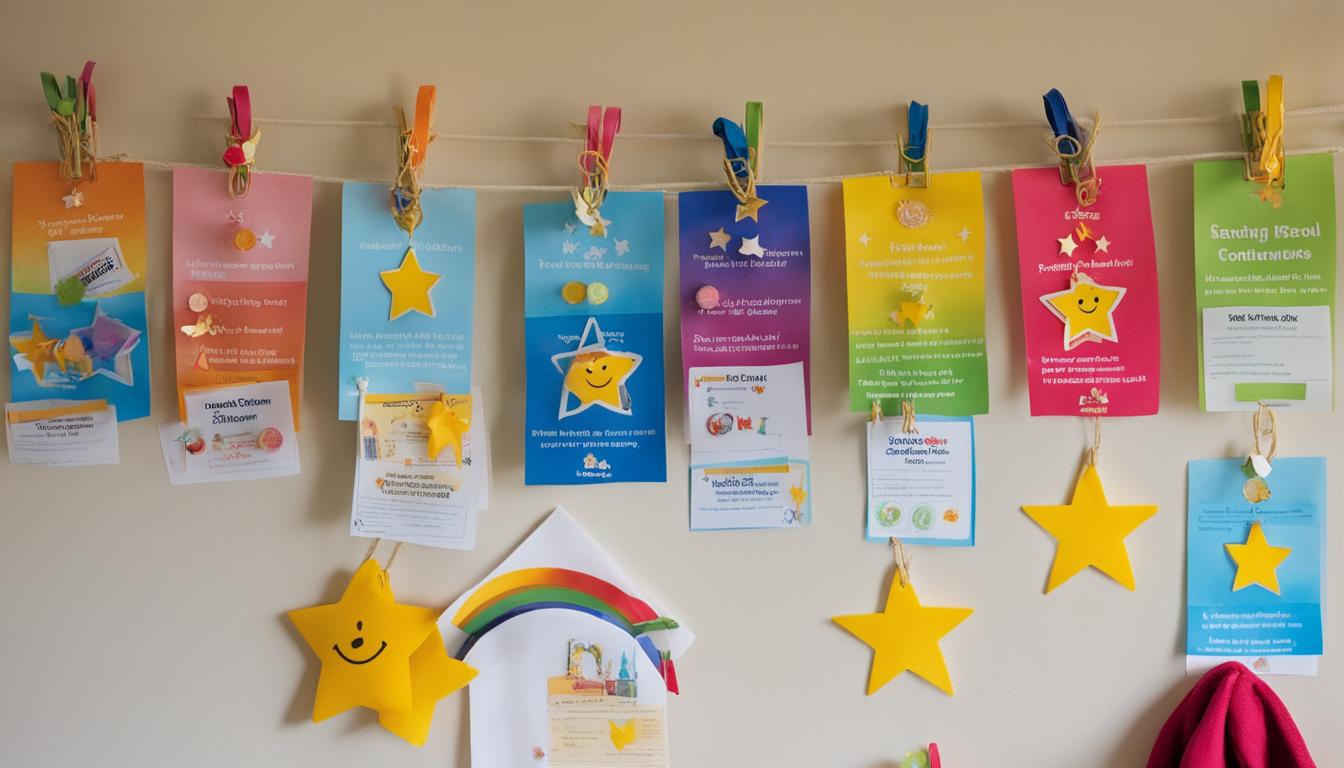Mastering Guidelines for Implementing House Rules and Consequences
As a dedicated parent, I recognize the challenges of navigating the adolescent years. I’ve explored various parenting strategies and found that implementing discipline through well-thought-out house rules is integral to establishing order at home. Encompassing the guidelines for implementing house rules is not just about maintaining decorum; it’s about teaching life skills that shape our teenagers into responsible adults. By drawing boundaries and enforcing the consequences of not following house rules, we foster an environment of accountability and security for our loved ones.
Laying down these guidelines requires a measured approach. While we all strive for our homes to be sanctuaries of creativity and expression, it’s equally essential to instill a sense of structure and respect for collective living. The journey of parenting teenagers calls for a delicate balance between liberating their individuality and equipping them with the virtues of goodness—compassion being paramount.
Key Takeaways
- Setting clear guidelines helps teenagers navigate their independence safely.
- Consequences for not following house rules are essential to teach responsibility.
- Implementing discipline goes hand-in-hand with nurturing teenage creativity.
- Establishing order at home provides a foundation for teens to grow ethically.
- Parenting strategies must evolve to encompass teenagers’ individual freedoms and collective responsibilities.
The Significance of Establishing House Rules and Their Impact
As a parent, I have discovered the benefits of having clear house rules in cultivating rule-based behavior in children, particularly during their teenage years. Establishing house rules and their importance cannot be overstated, as they are the framework within which our kids learn the crucial aspects of life management. By clearly setting boundaries at home, we not only protect our children but also prepare them for the responsibilities of adulthood. Let’s delve into the necessary categorization of rules and understand their far-reaching implications.
- Rules for safety: My primary concern is ensuring the welfare of my children. By discussing and setting clear road safety guidelines, we pave the way for responsible adulthood.
- Rules for accountability: Imbuing a sense of responsibility, curfews and expectations for house parties require teenagers to plan ahead, respect others, and face the consequences of their actions.
- Rules for communication: Demanding prior information about their plans fosters open dialogue, prepares them for the real world where reporting and accountability are key, and keeps them safe.
The importance of categorizing rules is to ensure they are digestible and manageable. It’s taking the large concept of discipline and breaking it down into areas our teenagers can understand and master: safety, accountability, communication. This division also allows us to introduce consequences in a structured manner that aligns with our goals of educating our teens about making beneficial choices and the impact their behavior can have.
The real aim is not just to establish authority but to encourage our children to regulate themselves, even when no one is watching. It’s the pivotal step in helping them transition from rule-based behavior in children to self-guided principles in adults.
For example, after explaining the rules around driving, I’ve watched my teenager grow in confidence, knowing they’re trusted with independence; but with it comes serious responsibilities, much like anything worth having in life. In discussing the setting of boundaries at home, like managing technology use or completing chores, we strike at the heart of what it means to participate in a household and, by extension, society. These discussions steer the benefits home, placing the emphasis on the critical learning that happens when we stick to a rule.
- Driving rules teach planning and foresight—skills crucial to any successful endeavor in life.
- Curfews reinforce the importance of time management and self-discipline.
- Moderating substance use underscores the value of self-control and health consciousness.
In conclusion, house rules aren’t just about maintaining control or asserting dominance; it’s about guiding our children through the labyrinth of growing up. It’s about preparing them for the world, one rule at a time.
Defining and Communicating House Rules Clearly to Your Household
My journey as a parent has underscored the importance of defining clear house rules and the positive impact they have on both the atmosphere at home and the personal development of my teenagers. In our household, structuring household guidelines is approached with a focus on teaching, rather than imposing, as it sets the stage for my children to learn invaluable life lessons through everyday practices.
Effective communication of rules is vital, as it fosters mutual respect and understanding between us. I have learned that setting the ground rules is more than laying out what should and shouldn’t be done; it’s about creating an environment where each member of the family feels heard and valued. Here, I will share how I go about articulating and instilling these rules within our home.
As a parent, my greatest desire is to raise individuals who are not only respectful and honest but also independent and thoughtful. Clear house rules are the catalyst for such development.
Let me walk you through some of our household guidelines that have proven effective:
- Modeling Respectful Behavior: It starts with us, the parents. I ensure to demonstrate respectful behavior towards my partner and others because I know my children are watching and will mimic my actions. Our rule states, “Treat others as you wish to be treated,” and we stick to it, always.
- Teaching Honesty: Honesty is a cornerstone in our house. We’ve created a safe space where truth can be shared without fear of harsh judgment, which has nurtured a bond of trust.
- Privacy and Boundaries: An essential lesson is respecting an individual’s space. We abide by the simple rule: Always knock and await a response before entering anyone’s room, ensuring privacy is maintained.
Discussing the rationale behind each guideline is key to ensuring my teenagers comprehend their significance, which naturally results in a respectful and private family environment. I take time to explain why we have each rule and how it benefits everyone, fostering a culture of respect and consideration. I believe that when rules are rational and transparent, they are more readily embraced.
The elaboration isn’t just verbal; we have clear, written copies of our house rules positioned in communal areas. This serves as a gentle reminder for every family member, reinforcing the principles we strive to live by. Moreover, I encourage my teens to participate in the rule-making process, giving them a sense of ownership and responsibility over the household’s well-being.

We cannot overlook the influence of environment. In our house, each space is designed to encourage adherence to rules – from a well-organized study space that induces focus on homework, to a welcoming dining area that invites family interactions minus digital distractions.
- Upon completion of homework, the study space must be tidied to nurture responsibility and organization.
- During meal times, all electronic devices are to be kept away from the table to promote family bonding and present-moment awareness.
- If someone wants to host guests, prior permission is required, teaching planning and respect for the household’s rhythm.
Thus, we maintain a structured, yet flexible, approach to rules that adapt to our evolving needs. It’s a balance that consistently reinforces the core values we wish to uphold, while allowing for growth and change. This adaptable structure ensures the relevance of our house rules, making them a constant guide rather than a rigid set of mandates.
In conclusion, having a clear set of house rules is far-reaching. It establishes behavior expectations and paves the way for honest communication, respect for privacy, and mutual consideration. My aim through these rules is not to constrain, but to constructively guide my children on their journey to adulthood.
Consequences for Breaking House Rules: Developing a Fair System
As the architect of my household’s structure, I firmly believe in a fair disciplinary system that clearly outlines the consequences for breaking house rules. Crafting an effective disciplinary framework is of paramount importance for fostering a productive home environment—a place where children, especially teenagers, can cultivate self-discipline and understand the ramifications of their choices.
Consistency in Applying Disciplinary Measures
I maintain a steadfast commitment to consistency in discipline. It is not just about enacting a penalty; it’s about reinforcing a reliable standard of behavior. When my children know what to expect as a result of their actions, it fosters a profound sense of security and trust. Whether it’s violating curfew or neglecting to buckle their seatbelt, the uniform disciplinary actions that follow are understood as both fair and necessary.
Trust grows in a garden where consistency reigns, and within this trust, our children learn the stability of expectations and the comfort of reliability.
Factors to Consider When Setting Consequences for Children
When establishing consequences for children, I always consider several factors. This includes the child’s age, individual maturity, and the specific context of their actions. I earnestly believe in tailored consequences for children that not only enforce discipline but also champion their personal development. This is the essence of age-appropriate discipline, ensuring that the lesson at hand is fully absorbed and internalized.
- An aptitude for road safety rules may carry a stern discussion on the value of life and the importance of vigilance.
- Transgressions in substance use merit a thorough dialogue on health risks and self-control.
- Lapses in communication about their whereabouts invite conversations about trust and safety.
Cognizant of these facets, establishing consequences for children becomes a thoughtful process aimed at harmonizing discipline with the imperative of nurturing young individuals.
Disciplinary Actions vs. Constructive Consequences
One must distinguish between traditional disciplinary actions and the notion of constructive consequences. The latter—my preferred method—are designed not to punish but to enlighten, guiding our teens towards making positive choices. Through educational consequences, I aim to impart lessons that will stick with them for life, such as the value of respect and the integrity of one’s word.
- Instead of merely reprimanding for disrespectful behavior, I encourage an apology and a reflection on the impact of their words.
- Rather than punish for borrowing without permission, I promote the restitution of the borrowed item and contemplation on the principles of trust.
- Breaking the house rule on privacy leads to a discussion about boundaries and the importance of mutual respect.
True positive discipline is embedded in these corrective strategies, which are replete with empathy and geared toward long-lasting personal growth. This approach avoids the trappings of authority for the sake of authority, and instead embraces discipline as a teaching tool—imbued with kindness, fairness, and clear-sighted intent.
By incorporating constructive feedback within our disciplinary approach, we build a bridge to greater understanding and empathy between parent and child, forging a future where our teenagers are equipped to navigate the complex socio-emotional landscape of adulthood.
House Rules for Technology and Digital Usage
As a parent in this digital era, I’ve observed how electronic devices can captivate the entire household. To manage this, we’ve implemented a set of technology house rules that serve as a compass for digital consumption. These rules are fundamental in teaching my kids about digital usage guidelines, creating a balanced environment where technology is used responsibly.
Our approach to screen time limits and safe internet practices is layered, taking into account the different needs and uses of technology. It’s not just about imposing time restrictions; it’s about understanding the role technology plays in our lives and respecting the times we should disconnect to reconnect with each other.
- Phones and computers are tools for knowledge and connectivity, but we ensure there are clear screen time limits to prevent overreliance and potential addiction.
- We’ve established digital usage guidelines that cover respectful device use during family time, especially at the dinner table where interactions should be personal and attentive.
One of the most integral lessons I’m conscious to impart involves safe internet practices. I strive for my kids to understand the weight of their digital footprint and the importance of maintaining privacy and discretion online.
In fostering these practices, I’ve aimed to be more than just a rule-setter, but also a guide and ally in navigating the complexities of the digital world. It’s about setting the groundwork for healthy habits that will follow them into adulthood.
- Our dinner table is a device-free zone, a rule that underscores the value we place on face-to-face communication.
- Homework and chores must be done before recreational screen time is allowed, establishing a sense of priority and self-discipline.
- Social media usage is monitored, with discussions surrounding the content they engage with and share, reinforcing the principles of safe internet practices.
In implementing these house rules, we often review them together, ensuring understanding and agreement. It’s critical that my children know the logic behind each guideline—it’s not arbitrary; it’s for their wellbeing and success in a rapidly advancing technological landscape.
To me, mastery in managing technology usage involves constant dialogue and an empathetic understanding of its multifaceted role in our lives. This journey isn’t just about setting restrictions; it’s an ongoing conversation about making informed choices and fostering a healthy respect for the power of our digital tools.
Discipline with Dignity: Balancing Strictness and Understanding
In my parenting journey, one of the most impactful lessons I have learned is the art of disciplining with dignity. This involves a careful balance between firmness and insight, aiming towards understanding teen behavior without compromising on necessary boundaries. Adolescence is filled with behavioral challenges and applying empathetic discipline strategies is key to a harmonious household.
Respectful parenting is not simply about being authoritative; it’s about being reasonably strict while showing empathy—guiding with a gentle hand rather than leading with an iron fist. When teenagers understand that we, as parents, respect their growing need for independence while simultaneously enforcing house rules, it fosters an environment where they feel secure and valued.
“True discipline is self-improvement rather than a punitive measure. When we use fear, we’re teaching fear, but when we use respect, we teach respect. The goal is to prepare children to function well in the world, not just while they’re under our roof.”
Responding to Behavioral Issues with Empathy
When it comes to balancing strictness and empathy, I’ve learned that the most effective approach begins with an empathetic response to behavior. This means listening to my teenagers, trying to understand the emotions behind their actions, and responding in a way that acknowledges those feelings, thereby understanding behavioral issues at a deeper level.
- Firstly, whenever possible, I engage in open discussions rather than immediate reprimand, which brings clarity and perspective to both sides.
- Secondly, I involve them in setting the consequences for breaking the rules, ensuring they play a role in their own governance, and promoting ownership of their actions.
- Lastly, I emphasize the ‘why’ behind each rule, aiming to cultivate intrinsic motivation to adhere to the household codes.
By adopting these empathetic discipline strategies, I aim to instill a sense of personal responsibility and mutual respect. Armored with empathy, my teenagers are more apt to comply with the rules we’ve set together, understanding that they’re in place not just to control but to protect and prepare them for the responsibilities of life.
- When teens partake in constructive dialogue over house rules, it underpins the principles of democracy and justice within our family circle.
- Understanding the rationale behind each rule fosters critical thinking and personal accountability in their decision-making processes.
- Respecting their input and point of view encourages teenagers to respect the household rules, themselves, and others around them.
As a parent, I’ve found that understanding teen behavior and responding with empathy leads to not only more effective discipline but also a more respectful and cooperative family life. The approach leaves room for growth and mistakes, important aspects of the journey into adulthood, while maintaining the dignity of all involved.
Enforcing House Rules: Tips for Effective Implementation
Enforcing house rules often feels like walking a tightrope; finding the right balance is essential for maintaining structure and ensuring a harmonious home life. Over my years of parenting, I’ve discovered that how to enforce house rules effectively lies in the delicate interplay between setting clear expectations and offering the right motivation for adherence.
The key to effective rule enforcement is consistent and open communication. It’s not simply enough to lay out what’s expected; we must also engage in ongoing discussions about the rules’ purposes and consequences. I apply this strategy directly from my experience in the hospitality sector, where providing clear expectations and support has proven to be the backbone of maintaining rule adherence.

Here are a few tips for implementing house rules that have worked in my home:
- Prompt and Personal Communication: Upon setting a new rule, I discuss it promptly with my teenager. I make the conversation personalized, illustrating how this rule benefits them personally and fits within the larger framework of our family life.
- Clarify Expectations: I clearly articulate the rules and the reasoning behind them. Whether it’s about curfew, digital device usage, or chores, I ensure my teen understands both the ‘what’ and the ‘why’.
- Proactive Support: Similar to ensuring guests have all they need during their stay, I offer proactive support to my teen. If the rule is about homework or chores, I’m available for guidance and help if they hit a snag.
House rules are not mandates from on high; they are the guardrails that guide our children on their path to independence and responsibility.
Another aspect of rule enforcement that I’ve borrowed from my professional experience is the importance of follow-up. After the rule has been in place:
- I check-in periodically to see how my teen is managing and to field any questions.
- If a rule is broken, I provide immediate and constructive feedback rather than waiting for a repeat offence.
- I remind my teen of their successes in following the rules to reinforce positive behavior.
Handling guest feedback in the hospitality industry has also informed my approach. When rules are broken:
- I address it with the same professionalism; first understanding the issue from their perspective, then calmly discussing the breach.
- I work with my teen to identify ways to avoid future infractions, just as I would address any concerns a guest might share.
Just as the hospitality industry thrives on excellent service and seamless experiences, a family thrives on clear expectations, support and understanding.
To maintain a sturdy foundation of rule adherence in the ever-changing landscape of adolescence, I hold onto the axiom: Clear, concise, and consistent communication fosters respect and cooperation. Through these methods, I do my best to ensure that the rules we set in our home serve their ultimate purpose—helping my teen navigate life with discipline, understanding, and integrity.
Adapting House Rules as Children Grow: The Evolving Nature of Boundaries
Watching my child mature has been a fascinating journey filled with learning and growth. As a parent, I’ve discovered the significance of adapting house rules to match the unique demands of each developmental stage. What was once a suitable rule for a toddler becomes irrelevant for a teenager, and as such, the process of retailoring guidelines to fit changing maturity levels has become a crucial aspect of parenting.
Retailoring Guidelines to Fit Developmental Stages
The evolution of our children requires us to adjust our approach to the boundaries we set at home. This adjustment is not just a reaction to their changing capabilities, but it’s also an opportunity to teach them the importance of evolving boundaries that reflect their maturing perspective.
One clear example is in the realm of responsibility. While a younger child may be tasked with keeping their room tidy, a teenager might take on more complex chores like managing their own schedules or contributing to family meal preparation. These developmentally appropriate rules align the expectations with their increasing capabilities and help them develop a sense of responsibility and self-reliance.
At every stage, the goal remains the same: to guide my children in a way that prepares them for independence while ensuring they remain connected to the values we cherish as a family.
- For elementary-aged children, house rules are more concrete, focusing on safety and basic behavior expectations.
- As children enter their preteen years, we begin aligning rules with developmental stages, allowing for more personal choice within a set framework to foster critical thinking and decision-making.
- By the time they reach adolescence, the emphasis shifts to accountability and ethics, transforming simple rules into complex guidelines that ensure personal and social responsibility.
An essential part of this process is revisiting and discussing house rules regularly. I believe in involving my children in these conversations, giving them a voice in the evolving household guidelines that will shape their daily lives. It strengthens their understanding of why rules exist and encourages them to abide by them not out of fear of consequences, but out of a shared agreement and understanding of their purpose.
- Every six months, we sit down to review our household rules to ensure they align with their current developmental needs.
- Annually, we assess the major milestones my children have reached and consider any necessary modifications to our household guidelines.
- Whenever a rule is outgrown or no longer applies, we have an open dialogue about removing or updating it.
House rules are not static; they breathe and grow just like our children do. It’s my responsibility to ensure these rules are finely tuned to each of my children’s growing edge, supporting their development while maintaining the structure and security that our family needs. This careful crafting of boundaries is the invisible framework that supports their journey toward responsible adulthood.
Maintaining a Positive Environment While Enforcing Rules
Creating a positive home environment remains a top priority for me, even as I navigate the waters of parental guidance and rule enforcement. I firmly believe that the key to enforcing rules positively is to foster a nurturing family atmosphere where understanding and mutual respect are cornerstone values. In our household, setting limits is done with compassion, and by involving my teenagers in the rule-making process, we preserve their sense of creativity and freedom.
My approach to establishing house rules centers around dialogue – explaining the reasoning behind each rule, which instills a sense of ownership and accountability in my children. This methodology does not stifle their spirits but equips them to flourish within a framework of agreed-upon boundaries. Consequently, the walls of our home resonate with laughter and the energy of inspired minds, even amidst the structure.
Ensuring that rules are perceived not as a hindrance, but as guiding principles for personal growth and collective wellbeing, has been instrumental in nurturing a family atmosphere where everyone thrives. My experience has shown me that this balance is both achievable and essential, and I am committed to continue fostering a home environment where respect, creativity, and discipline coexist harmoniously.
FAQ
What are the guidelines for implementing house rules?
Implementing house rules involves clearly defining the rules, communicating them effectively, ensuring they are understood by all household members, and consistently applying them. It’s also essential to establish the consequences of not following these rules and to take into account the individual needs of each family member when setting them.
Why are house rules important?
House rules are crucial because they establish a sense of order, safety, and expectations within a home. They help children develop discipline, understand boundaries, and learn vital life skills, such as time management and responsibility. Additionally, clear rules can prevent conflicts and misunderstandings, contributing to a more harmonious living environment.
How can I communicate house rules effectively to my family?
Communicate house rules by having a family meeting to discuss and agree upon the guidelines. Be clear, concise, and use language that is easily understood by all age groups present. It can also be helpful to write the rules down and post them in a common area to serve as a reminder.
What should be considered when establishing consequences for breaking house rules?
When establishing consequences, consider the age and maturity level of the child, the severity of the rule broken, and what the consequence is intended to teach. Aim for educational consequences that encourage reflection and better decision-making in the future, rather than just punitive actions.
How can I maintain consistency in applying disciplinary measures?
To maintain consistency, apply the same consequences for the same actions every time a rule is broken. Make sure all caregivers are aligned on the disciplinary measures and that responses to rule-breaking are predictable and fair.
How can I respond to behavioral issues with empathy while enforcing house rules?
By understanding the reasons behind a child’s behavior and responding with empathy, you can foster open communication and mutual respect. Discuss the behavior, help them understand the impact of their actions, and work together to find solutions while maintaining the integrity of the house rules.
What are some tips for enforcing house rules effectively?
To enforce house rules effectively, consistently apply the rules and consequences, be a role model for following the rules yourself, and maintain regular communication with family members about the importance of these guidelines. Praise and reward compliance to encourage continued obedience.
How should I adjust house rules as my children grow?
As your children grow and pass through different developmental stages, regularly review and adjust the house rules to ensure they remain relevant. Involve your children in this process to give them a sense of ownership and to make sure the rules align with their growing independence and maturity.
Can a positive home environment be maintained even with strict rules?
Yes, a positive environment can be maintained by setting strict rules alongside involving children in the rule-making process, providing clear explanations for rules, and allowing for flexibility when appropriate. Reinforce that rules are in place for safety and well-being, and be sure to recognize and celebrate when rules are followed.
How do house rules help in managing technology and digital usage?
House rules for technology can set limits on screen time, ensure safe internet practices, and encourage responsible use of digital devices. These rules can help prevent addiction, support healthy habits, and promote positive interaction within the family, especially during shared activities like meals or family time.
When should I retailor guidelines to fit my child’s current developmental stage?
Retailoring guidelines should be considered when you notice that a child’s maturity level, understanding, or life circumstances have significantly changed. This ensures that the rules remain effective, appropriate, and respectful of your child’s growth and needs.









